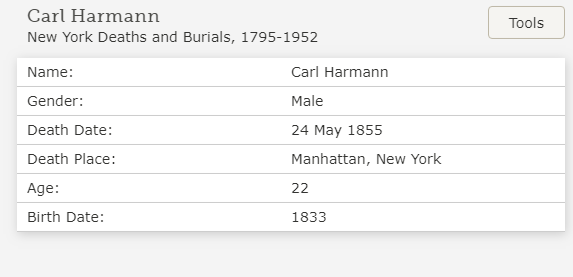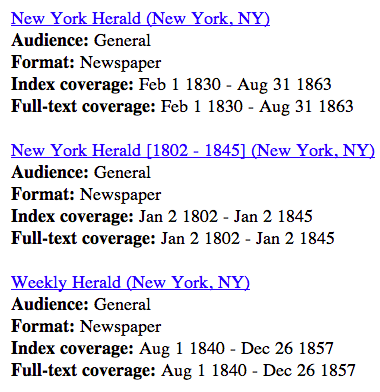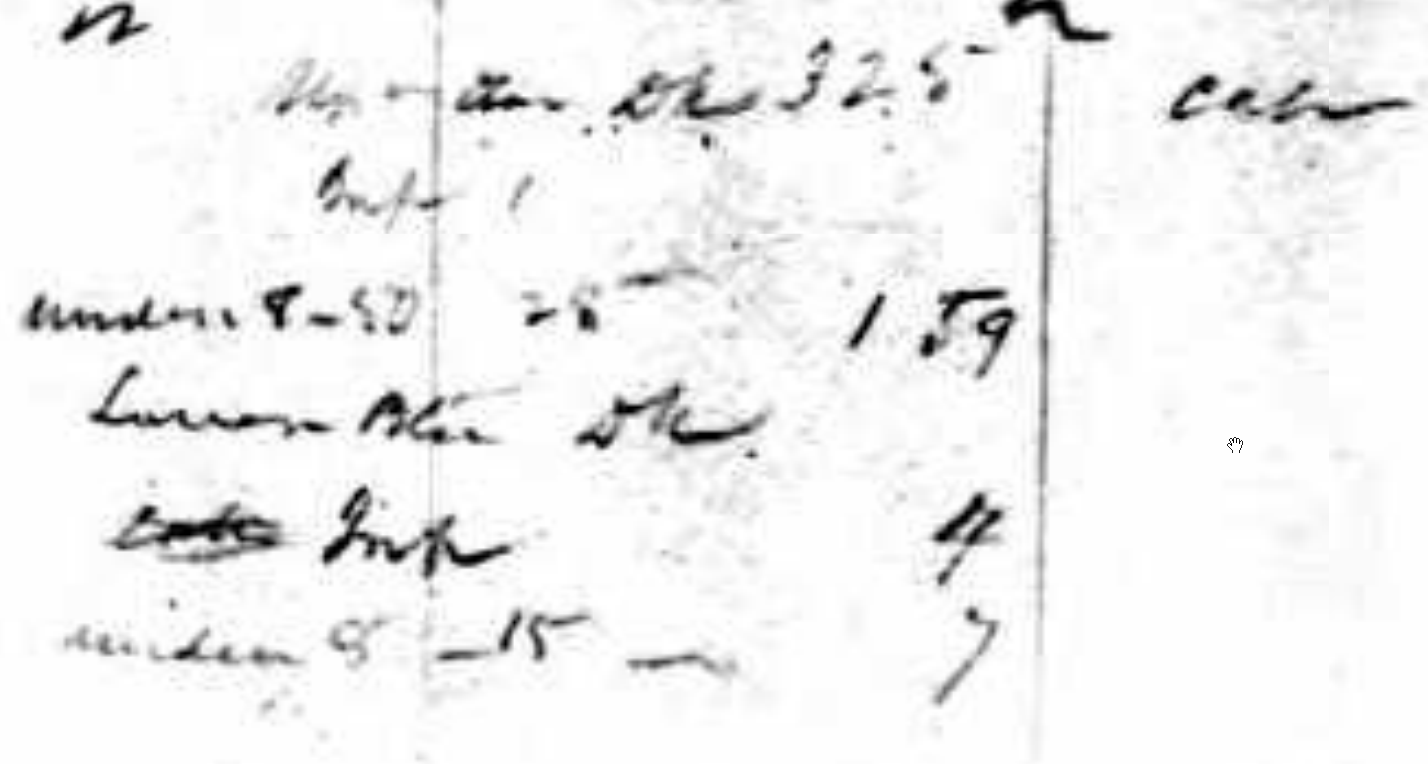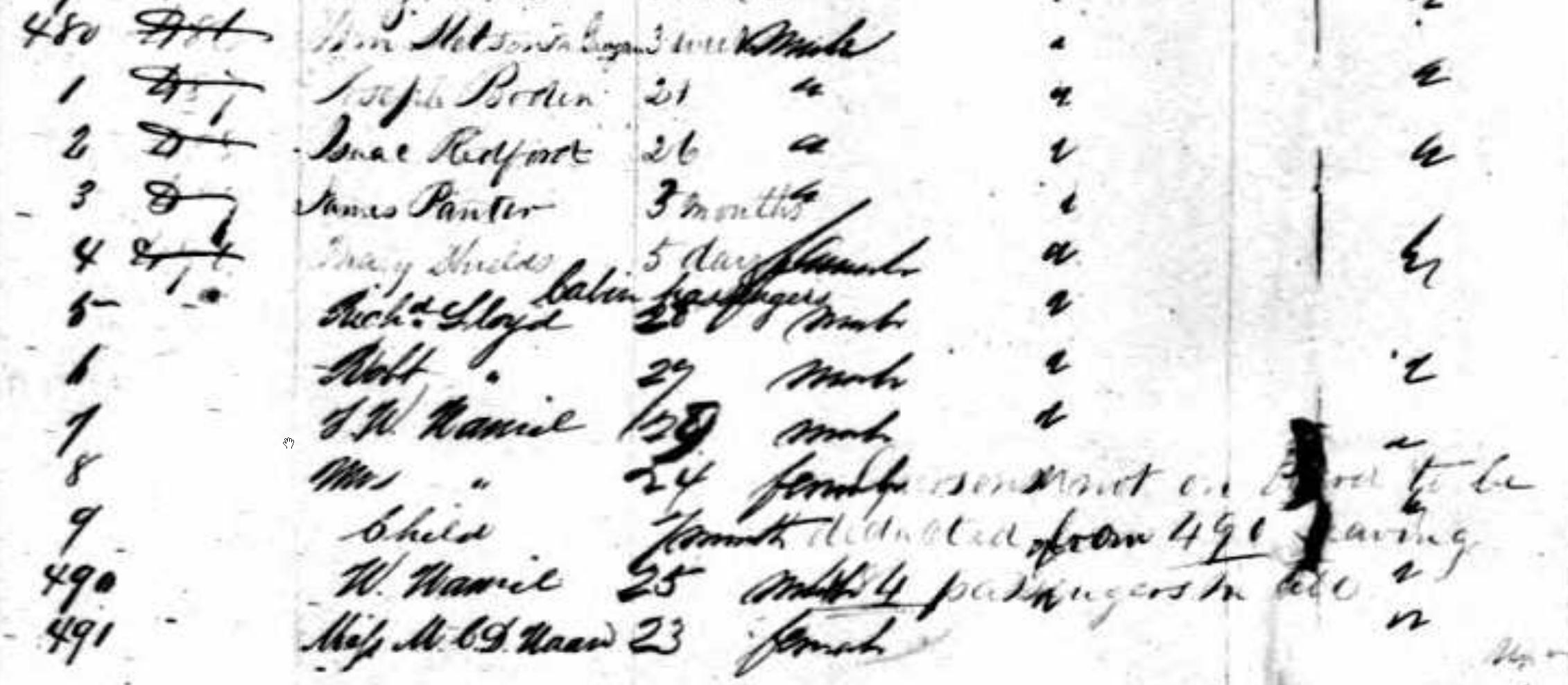Where else might information be lurking about these births and deaths?
Death Records and Cemetery Information
The Family History Library has a Register of New York City death records (update: this is no longer available to read online) describing what records the FHL holds. I haven't read the entire 209-page document yet, but when I was skimming it, this caught my eye: Manhattan Bodies in Transit, 1859-1894 (see page 153 of the PDF) about which I note the following:
- This is (seemingly) too late for the 1855 death in the question. Do other records of this kind exist, and if so, who holds them?
- Do similar records exist in the other boroughs?
- Is the 1859 start date of this collection a result of some regulation/law which started in 1859?
- Would people who died on a voyage from 1859 through 1894 be found in a collection such as this one?
- "There is no known index to this collection." (i.e. when the printed document was created in 2005. A searchable index has been added since I originally wrote the answer-- see below.)
(Obviously if one wanted to answer these questions, they could be arranged in a more sensible order.)
Contents:
- date of passage through New York
- name of deceased
- date of death
- place of death
- place of interment
- name and residence of person having charge of body
- disease which caused death
- sometimes age, nativity, occupation and attending physician
So near, and yet so far. However, if you search Bodies in Transit with a death date of 1855, there are 13 results, including this one for Carl Harmann for May 1855 (unfortunately the images are FHC-only):

Cross-checking this against the passenger lists or viewing the image of the transfer permit at an FHC might tell us whether Carl Harmann was a passenger on board a ship arriving in the port of New York.
Second thoughts: What happened to the bodies of people who died on board ship?
- For passenger lists which list 'nearest relative' or 'person going to meet' (post 1898) the master has contact information for someone who might be able to claim the body (later than this era). What happened in 1855, when the master did not have this information?
- What agent would be in charge of the bodies until they were claimed by family/friends?
- Some immigration records (seen while researching a question about immigrants arriving from Canada) exist which are listed by the agent's name. Do similar records exist / survive for New York?
- Does the New York Public Library have an online exhibit or resource guide?
For some arrivals, the name of person who claimed the body might be the information needed to determine if you have the right person. (This field has been very useful when viewing headstone applications for US Veterans.)
Note also there's a RootsWeb database THE FORGOTTEN OF ELLIS ISLAND Deaths in Quarantine, 1909-1911.
So, here's my question: If people died in Quarantine in 1855, having arrived at Castle Garden, what hospitals might they have been transferred to? Did the hospitals on Staten Island referenced on that page exist in 1855? If not, what hospitals might have taken in this kind of transfer, and what counties were they in?
I found a possible answer in Cecil Woodham Smith's The Great Hunger: Ireland 1845-1849. She describes the efforts at quarantine for the ships arriving from Ireland with passengers suffering from fever in chapter 12.
The quarantine buildings at the north-eastern point of Staten Island
covered about thirty acres of high ground and consisted of two
hospitals accommodating 400 persons, with, in addition, a smallpox
hospital for 50 cases, a workhouse for the destitute, and auxillary
buildings.
Her sources include the City Inspector's Annual Report from 1847 (City Inspector's Office, New York), a Congressional report on sickness aboard emigrant ships (33rd Congress) and special committee reports about the quarantine restrictions and about whether the quarantine station should be removed from Staten Island. Searching Google Books and WorldCat might turn up similar reports for 1855. Another possibility is to look for the reports of the Commissioners of Emigration for that year. The passengers who lived or died are not likely to be named in the reports, but the reports might have clues about what city departments might have recorded their names, and passed the summary of how many deaths occurred on board to the Commissioners.
The Olive Tree Genealogy website has a List of those who died while in Staten Island Quarantine May 1849 - Dec. 1850. This is the wrong time period for your voyage, but the page says that the information was reprinted with the permission of the Friends of Abandoned Cemeteries, Inc. Staten Island.
F.A.C.S.I. maintains many obscure records, original correspondence,
maps, etc. for a 200 year period for Staten Island as well as New
Jersey.
Between 1799-1858 most of those that died while in quarantine were
buried at two locations. One site in the St. George section of Staten
Island (cemetery operated between 1799-1849). The other known Staten
Island Quarantine Cemetery (operated 1849/50-1858) is located at what
is now the Silver Lake Golf Course.
For background information on burials in New York City, see the article
The Cemetery Belt, and the book Fairchild cemetery manual a reliable guide to the cemeteries of Greater New York and vicinity (1910). (Thanks to genealogist Laura DeGrazia for Tweeting links to these resources.)
Other information about the voyage
From Genealogy Bank: published Thursday, May 31, 1855, in the American Traveller (Boston, MA), Page 3:
The ship William Stetson, Capt. Jordan, from Liverpool, arrived at New
York on Sunday, brings 250 Mormons among the passengers, all bound
West. Among the infants there have been four deaths and two births,
one of them off Staten Island.
Bear in mind that 'infant' in 1855 meant a different age range than it does today. Jo B. Paoletti in her book Pink and Blue notes (pg 2) that "an 18-month-old would be considered an 'infant' in 1885 and a 'toddler' in 1935."
The Genealogy Bank blog posts tips on searching for ships there, like this installment Ship Records for Genealogy: Newspapers & Passenger Lists which includes examples of articles describing cholera outbreaks on ships from 1854.
Via Google Books I found brief mentions of the voyage in:
The William Stetson had a fair voyage across the Atlantic, and arrived
at New York on the twenty-seventh of May. Two births and four deaths
occurred on board.
THE "WILLIAM STETSON." -- The New York Herald of May 30, annoucnes the
arrival at that port of the William Stetson, May 27th. Two births
occurred on board, and four deaths. This vessel was the last we
despatched. (pages 395-6)
A discussion follows later on in this volume about the changes in the emigration acts that took place immediately following the sailing of the William Stetson.
More questions:
Might the births and deaths be listed in a different volume of the Millennial Star?
If births and deaths happened in LDS families, might there be other references to them in LDS church records (e.g. the stake records for the area where the births or deaths occurred)?
Birth Records
For those born on the voyage, the article on New York Vital Records on the Family Search Wiki says that whatever birth records might exist for 1855 will be at the town level.
Here is the link to the FHL's reference, The Register of New York City Births. It shows borough-level records available through the FHL with start dates that are later than 1855. On (printed) page iv (page 4 of the PDF) the section on Index codes states "Some New York City indexes use an alphabetic code for each borough" and lists Z=at Sea, so presumably some births and deaths at sea were registered -- but where?
Note that the 1855 arrival is before the consolidation of the five boroughs. It is also (unfortunately) before the date of the death indexes which are available to search via the Italian Genealogical Group or the search form on the One-Step Web Pages.
The Oral History of Ellen Jane (Parks) Johnstun found by ColeValleyGirl which tells of the birth of a boy named William Stetson [Parks] and the subsequent death of infant and mother says that "Mother was moved to Williamburg across from New York" before Mother and child died on 3 Jun 1855. Could this be Williamsburg, Brooklyn? The Register lists a record of deaths in the city of Brooklyn starting in 1847 (certificates are dated later, so this might be a register) with the index starting in 1848.
I also found a reference to the Commissioners of Emigration which revealed that they are New York State Commissioners of Emigration. Could their reports be at the State Archives as well as the NYC ones? (At first, I thought that their reports may have been lost in the 1911 fire at the State Library of New York.)
On a prior answer, I left this comment (posted Jul 19, 2015 at 22:59):
According to USCIS historian Marian L. Smith, the only records which
survive for NY arrivals before 1897 are US Customs House records,
created by the US Customs Service. The Castle Garden and Barge Office
passenger lists (which would have had immigration information like the
later lists) were transferred to Ellis Island and were destroyed in
the 1897 Ellis Island fire.
So the larger research questions remain: were the births / deaths on board supposed to be registered at this period, and if so, whose responsibility was it?
Ships logs and company records
Note also that while we think of the manifests required by the US as "arrival lists", during some periods they were filled out at the port of embarkation and amended and annotated as necessary. They were checked (not filled out) as people disembarked.
For this particular question, the surviving lists are US Customs House lists. I don't know as much about the process by which these lists were created as I do about the later passenger lists, but differences in handwriting might provide clues about what information was filled out first (e.g. if the list was created in the departure port) and what was added later.
As for other company records, I would expect that if a crewman died, his name would be listed in the ship's log, but I don't know if the ship's own log would list the birth and death of passengers. My questions are: where was the William Stetson registered, and what company was in charge of the ship? The home port might determine what regulations were in effect, and what information would be required in the log. There might be correspondence in the BT records held by TNA and/or in any company archives that survive for the shipping company.
Marian L. Smith presented a webinar on 27 March 2015 (repeated on 29 May 2015) as part of the "Records Found" Case Studies series at USCIS:
How Castle Garden Records Burned in the Ellis Island Fire
Exactly what records burned in the 1897 fire that consumed Ellis
Island? Were “some,” “many,” “most,” or “all” records destroyed?
Were passenger lists destroyed or “only administrative” records? Some
say State and municipal records were burned, but why would those
records be at a Federal immigration station? Did we really lose
anything in that fire? Join Marian L. Smith and the live USCIS
Records Found webinar at 1:00 p.m. ET on Friday, March 27th for
answers to these burning questions for New York passenger list
research.
During the webinar, Smith discussed the records that were created from the period 1820-1897, who holds them, and which records were lost in the fire at Ellis Island on June 15, 1897. (Technical problems made it difficult to hear the live presentation, so my notes are not complete, and in any case, mistakes in the section below are mine and not Smith's errors. Unfortunately, USCIS is not allowed to post recordings of their webinars, so I can't link to a recording.)
Looking at the passenger lists at Ancestry.com, here's what the card catalog says:
Passenger Lists of Vessels Arriving at New York, New York, 1820-1897.
Microfilm Publication M237, 675 rolls. Records of the U.S. Customs
Service, Record Group 36. National Archives at Washington, D.C.
This is the first group discussed by Smith in her lecture. It's important to remember that all records were created by agencies for their own purposes, most often because it was mandated by law, and that the information contained within was intended to meet the needs and mandates of the times. Since these records were created for the U.S. Customs Service, they are more concerned with what people are bringing into the country, and not as much about the people, as you would find on the immigration lists that we are used to from 1898 onwards.
Another set of records was created from 1855 to 1890 by the New York State Commissioners of Emigration, whose published annual reports are available at the New York State Library. However, in 1896 a law was passed authorizing the transfer of the registers kept by the NY State Commissioners to the Federal Government. Smith found clues about what information might have been in the registers from newspaper accounts, and information about the transfer of the ledgers from contemporary correspondence. The evidence she found shows that the ledgers were transferred to the custody of NY State to the Federal Government just in time to be burned up in the fire at Ellis Island on June 15, 1897. However, she notes that the NY State Library itself had a fire in 1911, so even if the records had not been transferred, they might have been lost anyway.
There are some voyages in this period for some ships where we have BOTH a U.S. Customs Service list and a passenger list which was created for immigration; if the ship stopped at ports other than New York, the passenger list might survive. One of Smith's slides showed a comparison of the Customs List and a Baltimore Passenger List for the ship WESSER (I believe that was from 1895). So it might be worthwhile to double-check the voyage of the William Stetson to see if the ship was scheduled to dock at other ports besides the Port of New York. If you can find a passenger list from another port from this time period, the header would show what information might have been on the passenger lists lost in the Ellis Island fire.
It would be interesting to see what we could find by comparing all the surviving lists for each voyage of these ships. I think Ancestry has published some teasers about correlating the data for the outbound and inbound passenger lists, but even if that project were complete, the UK Outbound Passenger lists kept by the Board of Trade (BT 27) date from 1890-1960, so they don't start early enough for this period. But a comparison of the passenger lists for each port, for ships that stopped at multiple ports in the USA, might give you some clues if the ship stopped somewhere before NYC. Perhaps sites like The Ships List or The Immigrant Ships Transcribers Guild would yield some clues.
This does not get us any closer to the answer about who died on the voyage, but it may explain why the information about people who died on board is missing or incomplete on the passenger list we have. U.S. Customs officials would have been concerned with the property of people who were on board ship for Customs purposes. They would not have been as concerned about the people who died on board, especially infants who had no property of their own.
Update
People researching events at sea in the early 20th Century can consult a collection of maritime registrations at the NYC Muni Archives:
The New York City Municipal Archives also holds two small collections
of vital records that are not specific to the past or present
boundaries of New York City. These are the maritime birth, death, and
marriage registrations, 1901-1948, and the death registers for United
States soldiers serving in Cuba and Puerto Rico, 1898-1900.
See Collection: REC0051 Maritime birth, death, and marriage registrations
More resources:





